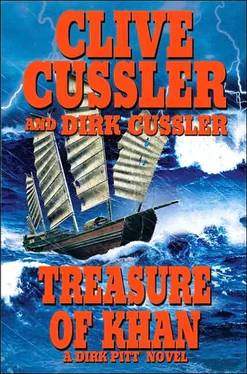"I'll bet that is how they found Genghis," Pitt remarked. "His tomb was supposedly buried in a hidden location in the mountains, along with Kublai Khan and other related royalty."
"And they're obviously using it to hunt for oil," Gunn added.
"A valuable technology that the oil companies would pay dearly for. Dr. von Wachter must be a rich man," Giordino said.
"I'm afraid he's a dead man. He and his team of German engineers were killed in a landslide in Mongolia a little over a year ago."
"Why does that sound suspicious?" Giordino added.
"Need I add that they were working for the Avarga Oil Company at the time," Yaeger said.
"More blood on the hands of Borjin," Pitt said without surprise. The ruthlessness of the Avarga Oil empire and its head, Tolgoi Borjin, was becoming old news.
"None of it adds up," Giordino said. "A seismic survey team murdered, another abducted. A tunnel borer, specialized drilling equipment, a vast disguised storage facility in the middle of the desert. One of several, according to our camel herder friend, Tsengel. All tied in to a system of underground pipelines running hidden across an empty desert. Yet no visible sign of output. Why?"
The room fell silent for a moment, the turning gears in everyone's heads nearly audible. Then a knowing look spread across Pitt's face.
"Because," he said slowly, "they have been unable to drill where the oil is."
"Borjin has probably greased enough wallets to drill anywhere he wants to in Mongolia," Giordino countered.
"But suppose the oil isn't in Mongolia?"
"Of course," Gunn said, the answer suddenly apparent. "He's found oil in China, or Inner Mongolia to be precise. How he convinced the Chinese to turn the land over, that's what I'd like to know."
"They're in a bad way," Yaeger said. "Because of the earthquakes in the Persian Gulf and the fire at their main oil import terminal near Shanghai, China has lost more than half of its oil imports overnight. They're in a desperate situation and liable to act a little irrational in order to find a quick fix."
"It would explain the storage facilities located by the border. They might already have some secret wells in Inner Mongolia pumping to one of the other storage sites," Pitt speculated. "The Chinese would only see the end product shipped from Mongolia and not know the oil originated in their own yard."
"I wouldn't want to be on this side of the Great Wall when they figure that scam out," Gunn said.
"It might explain why Borjin abducted the oil survey team from Baikal," Giordino said. "He probably needs their expertise to pinpoint the drill sites and get the oil out of the ground quickly."
"Seems like he could have hired that expertise on the open market," Yaeger said.
"Perhaps. But he probably didn't want to risk leaking the secret of where the oil deposits are located."
"Maybe he'll release them, now that he's got his deal with the Chinese," Gunn said.
"Not likely," Pitt replied. "They already murdered Roy and tried to kill us. No, I'm afraid they are as good as dead once Borjin has the information he wants out of them."
"Have you contacted the local American embassy yet? We need to get the political forces working to save them," Gunn said.
Pitt and Giordino looked at each other in affirmation.
"Diplomacy ain't going to work in this case, Rudi," Giordino said. "Borjin is too well protected. Our Russian friends have been trying that route to no avail, and they've got a lot more clout in this part of the world than we do."
"We've got to do something," he countered.
"We are," Pitt said. "We're going in after them."
"You can't do that. Going in under the name of the U.S. government might create an international incident."
"Not if the U.S. government doesn't know anything about it. And by the way, it's not just Al and me going in. You're coming with us."
A sick feeling struck Gunn in the stomach and he could feel the color drain from his face.
"I knew I should have stayed in Siberia," he muttered.
Dr. McCammon entered the NUMA computer center just as Yaeger hung up the phone to Mongolia. On the opposite side of the console, the holographic image of Max turned toward the marine geologist and smiled.
"Good evening, Dr. McCammon," she said. "Working late?"
"Uh, good evening," McCammon replied, not sure if he should feel foolish for conversing with a computerized image. He nervously turned and greeted Yaeger.
"Hello, Hiram. Long day?" he asked, noting that Yaeger was dressed in the same clothes he wore the day before.
"Very," Yaeger replied, suppressing a yawn. "A late request from the boss yesterday kept us busy. We expected to see you hours ago."
"Some unexpected meetings managed to kill most of my day. I understand if you didn't get a chance to retrieve the data from the earthquake center," McCammon offered.
"Nonsense," Yaeger replied, as if insulted. "Max can multitask with the best of them."
"Yes," Max replied. "And at least some of us keep our demeanor in the process."
"We pulled in the data last night," Yaeger continued, ignoring the comment, "and ran your program early this morning. Max," he said, facing the image of his wife, "please print Dr. McCammon a copy of the program results. And while that is running, why don't you give us a verbal overview of your findings."
"Certainly," Max replied. A large laser printer at the side of the room immediately began humming with the printed output while Max chose her words.
"The data received from the National Earthquake Information Center reflected global seismic activity for the last five years, including the two large quakes that just recently struck the Persian Gulf. I ran your software program, which analyzed the two earthquakes, then filtered their key commonalties against the entire database. Interestingly, there were several unique characteristics associated with the two earthquakes."
Max paused for effect, then stepped closer to Yaeger and McCammon before continuing.
"Both events were classified as extremely shallow earthquakes, as their epicenters were less than three kilometers beneath the surface. This compares to most shallow-focus earthquakes, which are typically in the five-to fifteen-kilometer depth range."
"That's a meaningful difference," McCammon said.
"Of less significance, both were tectonic quakes rather than volcanic in origin. And, as you know, both were large quakes, measuring over 7.0 on the Richter scale."
"Isn't that quite rare to have a pair of quakes with that magnitude?" Yaeger asked.
"It's a little unusual but not unheard of," McCammon said. "An earthquake of that size in Los Angeles would capture plenty of attention, but the fact is there is a 7.0 magnitude or greater earthquake occurring on average once a month somewhere around the world. Since they mostly strike in nonpopulated areas or under the sea, we don't hear much about them."
"That is correct," Max said. "Though there is a statistically significant anomaly in that the two quakes of that magnitude struck in such close proximity."
"Any other similarities, Max?" Yaeger asked.
"Yes. Though difficult to quantify, it appears that the damage produced by these earthquakes was not commensurate with their size. Significant structural damage was recorded at both sites, which exceeded the norm for similarly sized earthquakes. The actual damage was more reflective of what an 8.0
magnitude quake would produce."
"The Richter scale is not always an accurate measure of an earthquake's destructive power,"
McCammon noted, "particularly for shallow-focus events. In this case, we had two shallow quakes that proved highly damaging. The intensity on the ground was likely much higher than the magnitude rating indicated."
Читать дальше












